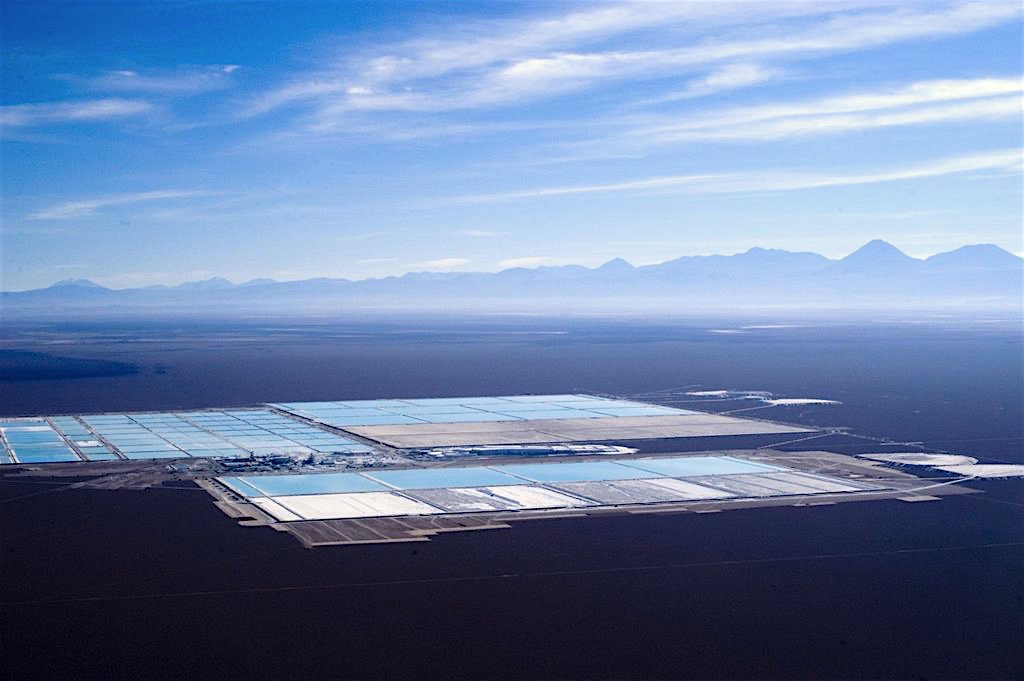Chinese-Korean group to build $2 billion lithium batteries plant in Chile


Chile contains half of the world's most "economically extractable" reserves of lithium. (Image courtesy of University of Chile)
Chinese and Korean investors are said to be in advanced talks with the Chilean government to open up a $2 billion mega-lithium batteries plant in the country's north, known for its vast salt flats under which experts say there is enough of the commodity to supply the world for decades.
Talks between government officials and representatives of three Chinese companies, including Vision Group, Kanhoo Group and MTL Shenzhen Group, as well as Chile-based Korean businessmen, are being held behind closed doors, local news site Pulso reports (in Spanish).
The main reason for that, the article says, is that - for years - Chile allowed only two companies to mine the increasingly popular metal. But the current leftist government recently changed the rules, putting up some deposits up for tender.
The first one was awarded to US specialty chemicals firm Albemarle Corp, which has signed a deal with the country's economic development agency Corfo promising to help triple Chile's lithium output.
With an initial investment of $500 million, the plant -once completed - will represent a $2 billion injection into Chile's economy and employ about 4,300 people.Michelle Bachelet's administration has said it sees public-private partnerships as the way forward and, in April, unveiled it was planning to open up more lithium deposits to foreign investors.
Fast forward eight months and the country is about to receive an initial $500 million from Asian investors to build a plant that once completed it will represent a $2 billion injection into Chile's economy and employ about 4,300 people.
The project, reports Pulso, would be developed in seven stages. Phase 1, 2 and 3 would begin production in January 2018, generating 1,000 tonnes of lithium carbonate that year. The facility will gradually hike output to 5,000 tonnes in 2022 and 10,000 by 2028, according to Nexis Consulting, Chilean firm advising the Asian conglomerate.
Chile, the Saudi Arabia of lithium
Lithium, frequently referred to as "white petroleum," drives much of the modern world, as it has become an irreplaceable component of rechargeable batteries used in high tech devices.
The market, while still relatively small - worth about $1bn a year - is expected to triple in size by 2025, according to analysts at Goldman Sachs.


Chile's Soquimich is a former state company with vast operations in the country's north and one of the world's biggest producers of lithium. (Image courtesy of Haroldo Horta Tricallotis | Panoramio.com)
That should be great news for Chile, as the country contains half of the world's most "economically extractable" reserves of the metal, according to the US Geographical Survey (USGS). It is also the world's lowest-cost producer, thanks to an efficient process that makes the most of the country's climate.
Chile is essentially "the Saudi Arabia of lithium," according to Marcelo A. Awad, executive director of the Chilean brand of Wealth Minerals, Canadian company that also has interests in Mexico and Peru.
The country, he noted in a recent interview, is perfectly positioned, with ports across the Pacific from the world's largest car market, China, which is expected to increase electric vehicles production in years to come. There, lithium is also used to manufacture rechargeable -batteries that power hundreds of millions of smartphones, digital cameras and laptops.
The challenge for foreign investors, particularly the Asian conglomerate, is to persuade Chilean authorities of making the leap from exporting the white metal to producing lithium batteries at the point of extraction.
Estimates from the group's advisors believe opening the proposed plant would make the value of the product 35 times higher than what it could be obtained by just selling it as lithium carbonate.